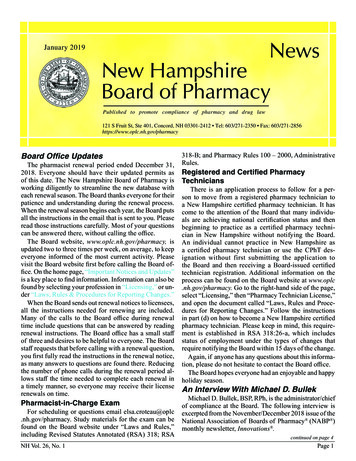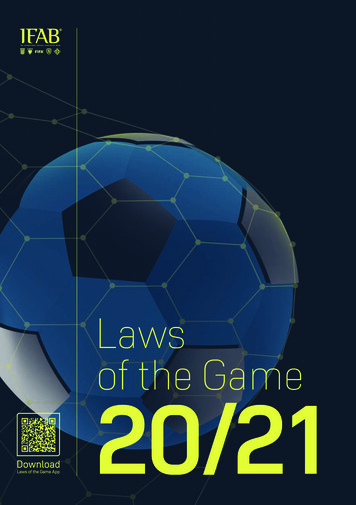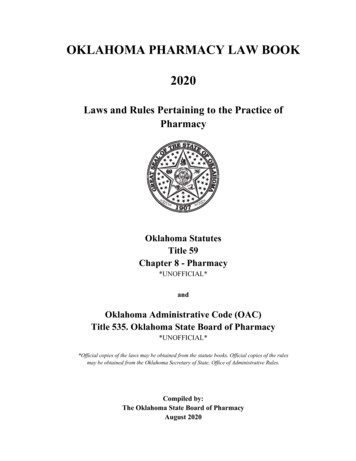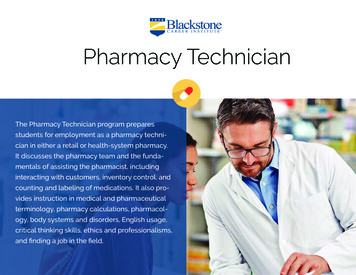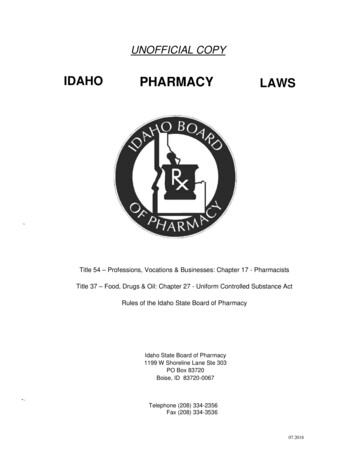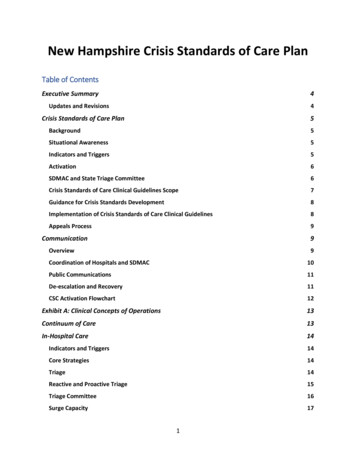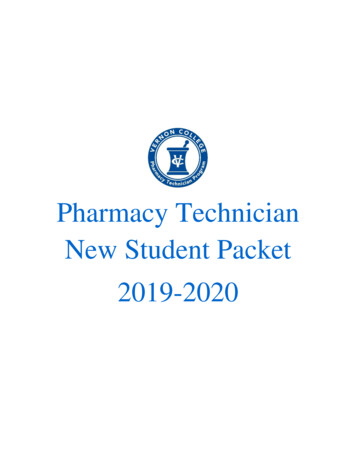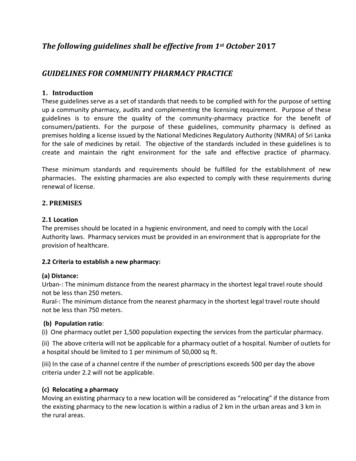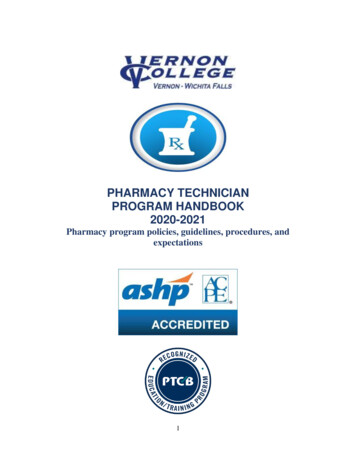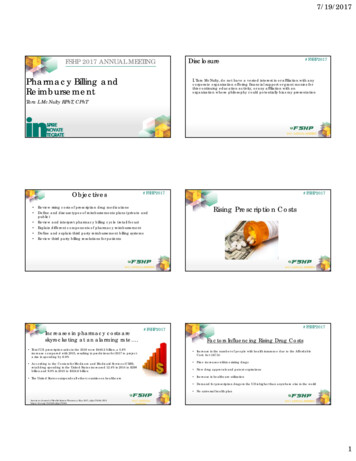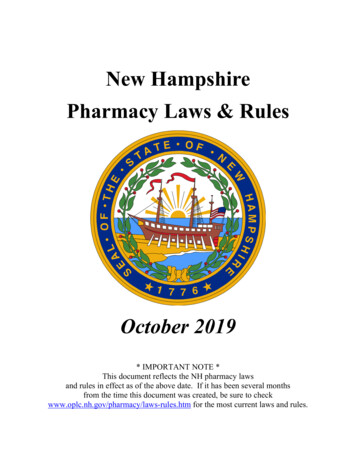
Transcription
New HampshirePharmacy Laws & RulesOctober 2019* IMPORTANT NOTE *This document reflects the NH pharmacy lawsand rules in effect as of the above date. If it has been several monthsfrom the time this document was created, be sure to checkwww.oplc.nh.gov/pharmacy/laws-rules.htm for the most current laws and rules.
NH Pharmacy Laws & Rules as of 10/29/2019TITLE XXXOCCUPATIONS AND PROFESSIONSCHAPTER 318PHARMACISTS AND PHARMACIESSection 318:1318:1 Definitions. –In this chapter:I. "Administer" means an act whereby a single dose of a drug is instilled into the body of, appliedto the body of, or otherwise given to a person or animal for immediate consumption or use.I-a. "Advanced practice registered nurse" means a person licensed to practice as an advancedpractice registered nurse in this state pursuant to RSA 326-B:18.II. "At retail" means the dispensing of drugs or medicines pursuant to the order of a physician,dentist, veterinarian, or advanced practice registered nurse, whether or not such drugs ormedicines are dispensed for a valuable consideration.III. "Board", when not otherwise limited, means the New Hampshire pharmacy board.III-a. "Compounding" means the preparation, mixing, assembling, packaging or labeling of adrug or device as a result of a practitioner's prescription drug order or initiative based on thepharmacist-patient-prescriber relationship in the course of professional practice or, for thepurpose of, or as an incident, to research, teaching, or chemical analysis, but not selling ordispensing. "Compounding" also includes the preparation of drugs or devices in anticipation ofprescription drug orders based on routine, regularly observed prescribing patterns."Compounding" shall not include the reconstitution of powdered formulations before dispensingor the addition of flavoring. "Compounding" shall not include the simple addition of flavoring,nor shall it include the preparation of a single dose of a nonhazardous commercially availabledrug or licensed biologic for administration within 2 hours of preparation to an individual patientwhen done in accordance with the manufacturer's approved labeling or instructions consistentwith that labeling.IV. "Dentist" means a practitioner of dentistry duly registered under the laws of this or someother state.V. "Dispense" means to distribute, leave with, give away, dispose of, deliver, or sell one or moredoses of a drug that will be administered or taken at a later date, time, or location and shallinclude the transfer of more than a single dose of a medication from one container to another andthe labeling or otherwise identifying a container holding more than a single dose of a drug.V-a. "Distributor" means a person or persons who supply or facilitate the supply of prescriptiondrugs to persons other than consumers.VI. "Drugs", when not otherwise limited, means all substances used as medicines or in thepractice of medicine.VI-a. "Fee splitting" means any discount, rebate, dividend, shared income, or economic benefitfrom the sale of prescription medicine by a pharmacist or pharmacy with an individual licensedto prescribe medicine or such individual's spouse or dependent children.Created 10/29/2019Page 2 of 295
NH Pharmacy Laws & Rules as of 10/29/2019VI-b. "Emergency medical care provider" means a person licensed to provide emergencymedical care under RSA 151-B.VI-c. "Foreign pharmacy graduate" is a pharmacist whose undergraduate pharmacy degree wasconferred outside the United States by a pharmacy school listed in the World Directory ofSchools of Pharmacy published by the World Health Organization.VI-d. "FPGEC" means the Foreign Pharmacy Graduate Equivalency Committee administered bythe National Association of Boards of Pharmacy.VI-e. "FPGEE" means the Foreign Pharmacy Graduate Equivalency Examination administeredby the National Association of Boards of Pharmacy and recognized and approved by the board.VI-f. "Hormonal contraceptives" means pills, patches, and rings which the United States Foodand Drug Administration (FDA) classifies as available by prescription for the purpose ofcontraception or emergency contraception. It does not include similar items classified as "overthe counter" by the FDA, intrauterine devices, shots, or intradermal implants.VI-g. "Law enforcement officer" means any officer of the state or political subdivision of thestate who is empowered by law to conduct investigations of or to make arrests for offensesenumerated in this chapter.VII. "Licensed pharmacist" or "pharmacist", when not otherwise limited, means a person holdinga license under RSA 318:18 and who is, therefore, legally authorized to practice the professionof pharmacy in this state.VII-a. "Limited retail drug distributor" means a distributor of legend devices or medical gasesdelivered directly to the consumer pursuant to a practitioner's prescription order, or federallyfunded clinics operated under contract with the department of health and human services anddrug abuse treatment centers, where legend and controlled drugs are held, stored, or dispensed topatients pursuant to the order of an authorized practitioner.VII-b. "Mail-order pharmacy" means a pharmacy that is located in a state of the United States,other than this state, whose primary business is to dispense a prescription drug or device under aprescription drug order and to deliver the drug or device to a patient, including a patient in thisstate, by the United States mail, a common carrier, or a delivery service. Mail-order pharmaciesinclude, but are not limited to, pharmacies that do business via the Internet or other electronicmedia.VIII. "Manufacturing" means the production, preparation, propagation, conversion or processingof a drug or device, either directly or indirectly, by large volume extraction from substances ofnatural origin, or independently by means of chemical or biological synthesis, and includes anypackaging or repackaging of a substance or labeling or relabeling of its container, and thepromotion and marketing of such drugs and devices for resale. Manufacturing shall be governedby Good Manufacturing Practices as adopted and enforced by the federal Food and DrugAdministration.IX. "Medicine", when not otherwise limited, means a drug or preparation of drugs in suitableform for use as a curative or remedial substance.IX-a. "Nurse" means a person licensed to perform registered nursing as defined in RSA 326-B.X. "Pharmacist-in-charge" means the pharmacist who shall be responsible for the practice ofpharmacy in and by a pharmacy, including, but not limited to, compliance with all local, state,and federal pharmacy and drug laws, and who shall be responsible for the operation of thepharmacy in the best interests of the public.XI. "Pharmacy", when not otherwise limited, means the place registered by the board where theCreated 10/29/2019Page 3 of 295
NH Pharmacy Laws & Rules as of 10/29/2019profession of pharmacy is practiced and where drugs, chemicals, medicines, prescriptions, orpoisons are compounded, dispensed, stored, or retailed.[Paragraph XI-a effective until January 1, 2020; see also paragraph XI-a set out below.]XI-a. "Pharmacy benefits manager" means any person or entity as defined in RSA 420-J:3,XXVIII-a.[Paragraph XI-a effective January 1, 2020; see also paragraph XI-a set out above.]XI-a. "Pharmacy benefits manager" means "pharmacy benefits manager" as defined in RSA 402N:1, VIII.XI-b. "Pharmacy technician" means a person, other than a pharmacist or a pharmacy intern,either registered or certified by the board for the purpose of assisting a pharmacist in the practiceof pharmacy.XI-aa. "Pharmacy intern" means a person who is registered by the board pursuant to RSA318:15-b and:(a) Is enrolled in a professional degree program of a school or college of pharmacy that has beenapproved by the board and is satisfactorily progressing toward meeting the requirements forlicensure as a pharmacist starting no earlier than 4 months prior to the third year of study; or(b) Is a graduate of an approved professional degree program of a school or college of pharmacyor is a graduate who has established educational equivalency by obtaining a Foreign PharmacyGraduate Examination Committee (FPGEC) Certificate, who is currently licensed by the boardof pharmacy for the purpose of obtaining practical experience as a requirement for licensure as apharmacist; or(c) Is a qualified applicant awaiting examination for licensure or meeting board requirements forre-licensure; or(d) Is participating in a residency or fellowship program.XII. "Physician" means a practitioner of medicine duly licensed under the laws of this or someother state.XII-a. "Physician assistant" means a person licensed as a physician assistant under RSA 328-D.XII-b. "Podiatrist" means a person authorized by law to practice podiatry in this state pursuant toRSA 315.XIII. "Poisons", when not otherwise limited, means any drug, chemical medicine or preparationliable to be destructive to adult human life in quantities of 60 grains or less.XIV. "Practice of pharmacy" means the professional acts performed by a pharmacist and shallinclude the interpretation and evaluation of prescription orders; the administration,compounding, dispensing, labeling and distribution of drugs and devices; the participation indrug selection and drug-related device selection; drug evaluation; utilization or regimen review;the monitoring of drug therapy and use; medication therapy management in accordance withcollaborative pharmacy practice agreements; the proper and safe storage and distribution ofdrugs and devices, and the proper maintenance of proper records; the responsibility of advising,when necessary or when regulated, of therapeutic values, hazards, and use of drugs and devices;and the offering or performing of these acts, services, operations, or transactions necessary in theCreated 10/29/2019Page 4 of 295
NH Pharmacy Laws & Rules as of 10/29/2019conduct, operation, management, and control of pharmacy.XV. "Practitioner" or "licensed practitioner" means any person who is lawfully entitled toprescribe, administer, dispense or distribute legend drugs to patients.XV-a. "Practitioner-patient relationship" means a medical connection between a licensedpractitioner and a patient that includes an in-person or face-to-face 2-way real-time interactivecommunication exam, a history, a diagnosis, a treatment plan appropriate for the practitioner'sscope of practice, and documentation of all prescription drugs including name and dosage. Apractitioner may prescribe for a patient whom the practitioner does not have a practitionerpatient relationship under the following circumstances: for a patient of another practitioner forwhom the prescriber is taking call; for a patient examined by another New Hampshire licensedpractitioner; or for medication on a short-term basis for a new patient prior to the patient's firstappointment. The definition of a practitioner-patient relationship shall not apply to a practitionerlicensed in another state who is consulting to a New Hampshire licensed practitioner with whomthe patient has a relationship.XVI. "Prescription" means a verbal, or written, or facsimile or electronically transmitted orderfor drugs, medicines and devices by a practitioner licensed in the United States, to becompounded and dispensed by licensed pharmacists in a duly registered pharmacy, and to bekept on file for a period of 4 years. A written order shall include an electronic transmissionprescription received and retained in a form complying with rules adopted pursuant to RSA318:5-a, XV. Prescriptions may also apply to the finished products dispensed or administered bythe licensed pharmacist in the registered pharmacy, on order of a licensed practitioner as definedin this section.XVI-a. "Prescription device" or "legend device" means an instrument, apparatus, implement,machine, contrivance, implant, or other similar or related article, including any component partor accessory, which is restricted for distribution and use only upon the order of a licensedpractitioner.XVII. "Prescription drug", "legend drug," or "potent drug" means:(a) A drug which under federal law is required, prior to being dispensed or delivered, to belabelled with any of the following statements:(1) "Caution federal law prohibits dispensing without prescription", or(2) "Caution federal law restricts this drug to use by or on the order of the licensed veterinarian",or(3) "RX only", or(b) A drug which is required by any applicable federal or state law or regulation to be dispensedon prescription only or is restricted to use by practitioners.XVIII. "Nonprescription or proprietary medicine" shall mean non-narcotic medicines or drugswhich may be sold without a prescription and which are prepackaged for use by the consumerand labeled in accordance with the requirements of the laws of this state and the federalgovernment, provided that this definition shall not include the following:(a) A drug, the label of which bears substantially either the statement "Caution-federal lawprohibits dispensing without prescription" or "Warning-may be habit forming."(b) A drug intended for injection.XIX. "Supervision" means under the direct charge or direction and does not contemplate absenceof the person responsible for providing such supervision, except where permitted by rules of theboard under RSA 318:5-a, XIV.XIX-a. "TOEFL" is the Test of English as a Foreign Language, as administered by AmericanCreated 10/29/2019Page 5 of 295
NH Pharmacy Laws & Rules as of 10/29/2019College Testing (ACT), or its successor, and certified by the FPGEC.XX. "Veterinarian" means a practitioner of veterinary medicine duly registered under the laws ofthis or some other state.XXI. "Wholesaler" means a person with facilities in or outside this state who obtains drugs fordistribution or delivery to persons other than consumers.XXII. "Automated pharmacy system" means mechanical systems that perform operations oractivities, other than compounding or administration, relative to the storage, packaging,dispensing, or distribution of medications, and which collects, controls, and maintains alltransaction information.XXIII. "Central prescription processing" means the processing by a pharmacy of a request fromanother pharmacy to fill or refill a prescription drug order or to perform processing functions,such as dispensing, drug utilization review, claims adjudication, refill authorizations, andtherapeutic interventions.XXIV. "Electronic transmission prescription" means both image transmissions of a prescriptionorder for which a facsimile of the order is received by a pharmacy from a licensed prescriber,and data transmissions of a prescription order, other than an electronic image transmissionprescription, that is electronically transmitted by computer link, modem, or other computercommunication device from a licensed prescriber to a pharmacy.XXIV-a. "Electronic signature" means an electronic sound, symbol, or process attached to orlogically associated with a record and executed or adopted by a person with the intent to sign therecord.XXV. "Attending practitioner" means the physician or advanced practice registered nurse whohas the primary responsibility for the treatment and care of the patient.XXVI. "Collaborative pharmacy practice" means the practice of pharmacy whereby one or morepharmacists jointly agree, on a voluntary basis, to work in conjunction with one or moreattending practitioners under written protocol whereby the collaborating pharmacist orpharmacists may perform medication therapy management authorized by the attendingpractitioner or practitioners under certain specified conditions and limitations.XXVII. "Collaborative pharmacy practice agreement" means a written and signed specificagreement between a pharmacist, an attending practitioner, and the patient or patient's authorizedrepresentative who has granted his or her informed consent, that provides for collaborativepharmacy practice for the purpose of medication therapy management for the patient.XXVIII. "Medication therapy management" means the review of medication therapy regimens ofpatients by a pharmacist for the purpose of evaluating and rendering advice to a practitioner, orevaluating and modifying the medication regimen in accordance with the collaborative pharmacypractice agreement. Decisions involving medication therapy management shall be made in thebest interest of the patient. Medication therapy management shall be limited to:(a) Implementing, modifying, and managing medication therapy according to the terms of thecollaborative pharmacy practice agreement;(b) Collecting and reviewing patient histories within the context of needs for pharmacy practice;(c) Obtaining and checking vital signs, such as pulse, temperature, blood pressure, andrespiration;(d) Ordering laboratory tests as specifically set out in the collaborative pharmacy practiceagreement between the pharmacist and the attending practitioner that are specific to themedication or protocol-driven;(e) Formulating a medication treatment plan that will be shared with the patient's attendingCreated 10/29/2019Page 6 of 295
NH Pharmacy Laws & Rules as of 10/29/2019practitioner;(f) Monitoring and evaluating the patient's response to therapy, including safety andeffectiveness;(g) Performing a comprehensive medication review, in conjunction with the attendingpractitioner, to identify, resolve, and prevent medication-related problems, including adversedrug events;(h) Documenting the care delivered and, if applicable, communicating essential information tothe patient's other health care providers; and(i) Providing education and training designed to enhance patient understanding and theappropriate use of his or her medications.XXIX. "Reverse distributor" means a person or persons who facilitate the removal, disposal, ordestruction of prescription drugs to persons other than consumers.XXX. "Outsourcing facility" means a facility at one geographic location or address that isengaged in the compounding of sterile drugs, has elected to register as an outsourcing facility,and complies with all of the requirements of section 503B of the Federal Food, Drug, andCosmetic Act.XXXI. (a) "Research organization" means an entity, including a biotechnology company orresearch institute, whose primary goal is to conduct fundamental research, industrial research, orexperimental development relating to drug products, disease and drug diagnostics, and/or drugmanufacturing technologies.(b) A "research organization" shall not include:(1) A "sponsor," "sponsor-investigator," or "contract research organization" as such terms aredefined in 21 C.F.R. section 312.3;(2) An "applicant" as such term is defined in 21 C.F.R. section 314.3; a "manufacturer,""processor," "packer," or "distributor" as such terms are used in the Federal Food, Drug, andCosmetic Act (21 U.S.C. section 301 et. seq.); or(3) A "manufacturer" or "applicant" as such terms are used in 21 C.F.R. section 601.2.XXXII. "Researcher" means a qualified person representing a research organization licensed bythe board pursuant to RSA 318:51-f.XXXIII. "Licensed advanced pharmacy technician" means a person licensed by the board who:(a) May perform all functions allowed by federal or state law and approved by the board, underthe supervision of a licensed pharmacist who is physically on premises and holds an unrestrictedlicense issued by the board.(b) May conduct product verification, process refills, verify repackaging of drugs, and performother pharmacist tasks not required to be completed by a licensed pharmacist.(c) May perform duties allowed by either certified or registered pharmacy technicians.(d) Shall not interpret or evaluate a prescription or drug order, verify a compounded drug, orcounsel or advise individuals related to the clinical use of a medication.Source. 1921, 122:1. 1925, 84:1. PL 210:1. 1941, 140:1. RL 256:1. RSA 318:1. 1957, 72:1, 2.1967, 82:1. 1973, 453:3. 1979, 155:1-9. 1981, 484:18, 19. 1985, 324:1. 1992, 245:1. 1993, 67:1;78:1-3. 1994, 333:1-3. 1996, 267:20. 1997, 149:1-3. 1998, 67:2. 2000, 187:1; 188:1; 271:4.2001, 15:1; 282:1-3. 2002, 281:1-3. 2005, 177:126, 127; 293:6. 2006, 164:1-3. 2007, 202:1-3.2008, 217:1. 2009, 54:5. 2010, 74:1; 259:9. 2011, 63:3; 111:1. 2013, 105:3; 121:1, 2. 2014,150:2, eff. Aug. 15, 2014. 2015, 180:2, 203:1, eff. July 1, 2015; 246:1, eff. Sept. 11, 2015. 2018,Created 10/29/2019Page 7 of 295
NH Pharmacy Laws & Rules as of 10/29/2019205:1, eff. Aug. 7, 2018; 263:1, eff. June 12, 2018. 2019, 58:1, eff. July 1, 2019; 320:3, eff. Jan.1, 2020.Section 318:1-a318:1-a Exceptions and Exemptions Not Required to be Negated. – In any complaint,information, or indictment, and in any action or proceeding brought for the enforcement of anyprovision of this chapter, it shall not be necessary to negate any exception, excuse, proviso, orexemption contained herein, and the burden of proof of any such exception, excuse, proviso orexemption shall be upon the defendant.Source. 1987, 181:4, eff. May 12, 1987.Pharmacy BoardSection 318:2318:2 Board. – There shall be a pharmacy board consisting of 7 members; including 6practicing pharmacists, at least one of whom shall be a full-time hospital pharmacist, and onepublic member, each to be appointed by the governor, with the approval of the council, to a termof 5 years. No member shall be appointed to more than 2 consecutive terms and no member shallserve for more than 10 consecutive years. Only board members provided for in this section shallhave the authority to vote in board determinations.Source. 1921, 122:2. PL 210:2. RL 256:2. RSA 318:2. 1973, 453:13. 1979, 155:10. 1981, 484:3.2009, 66:1, eff. Aug. 8, 2009.Section 318:2-a318:2-a Repealed by 2015, 276:108, IX, eff. July 1, 2015. –Section 318:3318:3 Eligibility. –I. Pharmacist members of the board shall have been licensed pharmacists for at least 10 years,and at the time of their appointment shall have practiced pharmacy in this state for at least 5years.II. The public member of the board shall be a person who is not, and never was, a member of thepharmaceutical profession or the spouse of any such person, and who does not have, and neverhas had, a material financial interest in either the provision of pharmaceutical services or anactivity directly related to pharmacy, including the representation of the board or profession for afee at any time during the 5 years preceding appointment.Source. 1921, 122:2. PL 210:3. RL 256:3. RSA 318:3. 1973, 453:1. 1981, 484:4, eff. July 1,1981.Created 10/29/2019Page 8 of 295
NH Pharmacy Laws & Rules as of 10/29/2019Section 318:4318:4 Compensation. – The members of the board shall be paid 100 a day and theirnecessary expenses while actually engaged in the performance of their duties.Source. 1921, 122:2. PL 210:4. RL 256:4. RSA 318:4. 1963, 83:1. 1973, 453:2. 1979, 155:11.1981, 484:18. 2007, 202:4, eff. Jan. 1, 2008.Section 318:5318:5 Officers and Duties. –I. The board shall have a president, vice-president, and a secretary, who shall be elected fromamong their number annually in the month of September.II. The president shall serve as chief executive officer of the board and shall preside at allmeetings and hearings of the board and shall appoint any subcommittees from among themembers as deemed necessary. In the absence of the president, the vice-president shall performthe duties of the president.Source. 1921, 122:2. PL 210:5. RL 256:5. RSA 318:5. 1979, 155:12. 1981, 484:18. 1985, 324:2,eff. Jan. 1, 1986. 2019, 264:1, eff. Sept. 17, 2019.Section 318:5-a318:5-a Rulemaking Authority. –The board shall adopt rules, pursuant to RSA 541-A, relative to:I. The application procedure for any license issued under this chapter;II. The qualifications of applicants in addition to those requirements set by statute;III. Design and content of all forms required under this chapter;IV. How an applicant shall be examined, including:(a) Time and place of examination;(b) The subjects to be tested;(c) Passing grade; and(d) Disposition of examination papers;IV-a. The standards for registering pharmacies and licensing pharmacists and the practice ofpharmacy;IV-b. The standards for licensure of research organizations;V. How a license shall be renewed;VI. Ethical standards required to be met by each holder of any license issued under this chapterand how such license may be revoked for violation of these standards;VII. The establishment of all fees and fines required under this chapter, including applicationfees for nonresidents. Fees for licensure of research organizations shall not be greater than thefees charged for registering pharmacies;VII-a. Continuing education requirements under this chapter;VIII. Procedures for the conduct of hearings consistent with the requirements of due process;IX. Procedures for the inspection of licensees;X. Registration or certification of pharmacy technicians, including:Created 10/29/2019Page 9 of 295
NH Pharmacy Laws & Rules as of 10/29/2019(a) Requirements for registration or certification;(b) The duties, functions, and standards of conduct of pharmacy technicians;(c) Requirements for the supervision of pharmacy technicians by licensed pharmacists;(d) Standards for denial and revocation of registration and certification;(e) Establishment of the effective period of registration or certification;(f) Requirements for renewal of registration or certification; and(g) Requirements for reinstatement of registration or certification.XI. The establishment of fees for registration or certification of pharmacy technicians, includingfees for renewal or reinstatement.XI-a. Registration of pharmacy interns, including:(a) Requirements for registration;(b) The duties, functions, and standards of conduct of pharmacy interns;(c) Requirements for the supervision of pharmacy interns by licensed pharmacists;(d) Standards for denial and revocation of registration;(e) Establishment of the effective period of registration;(f) Requirements for renewal of registration; and(g) Requirements for reinstatement of registration.XI-b. The establishment of fees for registration of pharmacy interns, including fees for renewalor reinstatement.XI-c. Licensure of advanced pharmacy technicians, including:(a) Requirements for licensure, including experience and education requirements.(b) The duties, functions, and standards of conduct of licensed advanced pharmacy technicians.(c) Standards for the supervision of licensed advanced pharmacy technicians by licensedpharmacists.(d) Standards for denial and revocation of licensure.(e) Establishment of the effective period of a license.(f) Requirements for renewal of a license.(g) Requirements for reinstatement of a license.XII. Procedures for the use, documentation, security, maintenance, and monitoring of automatedpharmacy systems, including the placement of automated pharmacy systems in long-term carefacilities, hospices, and state or county correctional institutions, for the purposes of storage anddispensing of controlled and non-controlled prescription drugs.XIII. Standards for contracting, implementation, and operation of central prescription processing.XIV. The adoption of protocols and procedures for the temporary absence of a pharmacist from apharmacy while on duty.XV. The requirements for the use of electronic transmission prescriptions, including the contentsof such order and the verification of electronic signatures.XVI. Procedures and protocols for emergency contraception drug therapy, pursuant to RSA318:47-e.XVII. The education and training standards and other requirements for pharmacists who,pursuant to prescriber-approved protocol:(a) Administer prescription medications, including influenza immunizations.(b) Engage in collaborative pharmacy practices.XVIII. Disclosure and confidentiality relative to the New Hampshire Rx advantage program,pursuant to RSA 161-L:3.Created 10/29/2019Page 10 of 295
NH Pharmacy Laws & Rules as of 10/29/2019XIX. Dispensing hormonal contraceptives in accordance with RSA 318:47-l.XX. The standards and procedures for licensure of drug or device distribution agents.Source. 1981, 484:5. 1985, 324:3. 1988, 106:1; 210:3. 2000, 188:2. 2001, 282:5, 6. 2002, 281:4.2005, 131:2; 177:128, 129. 2006, 164:4. 2007, 202:5, 6; 297:9. 2013, 105:2, eff. Aug. 23, 2013.2015, 203:2, 3, eff. July 1, 2015. 2018, 205:3, eff. Aug. 7, 2018. 2019, 58:2, eff. July 1, 2019;264:2, eff. Sept. 17, 2019.Section 318:5-b318:5-b Completion of Survey; Rulemaking. – The board shall adopt rules, pursuant to RSA541-A, requiring, as part of the license renewal process, completion by licensees of a survey oropt-out form provided by the office of rural health, department of health and human services, forthe purpose of collecting data regarding the New Hampshire primary care workforce, pursuant tothe commission established in RSA 126-T. Any rules adopted under this section shall provide thelicensee with written notice of his or her opportunity to opt-out from participation in the survey.Source. 2017, 131:4, eff. June 16, 2017. 2019, 254:6, eff. July 1, 2019.Section 318:6318:6 Secretary. – It shall be the duty of the secretary to keep a record of the meetings of theboard and to conduct its correspondence. The secretary shall file a record of the licensure ofpharmacists which shall be open to the inspection of any person in the office of the secretary ofstate.Source. 1921, 122:3. PL 210:6. RL 256:6. 1949, 280:2. RSA 318:6. 1979, 155:13. 1981, 484:18,20, eff. July 1, 1981.Section 318:6-a318:6-a Fees. –I. The board shall establish fees for examination of applicants, for licenses and for renewal oflicenses to practice pharmacy, for licensed advanced pharmacy technicians, for registration andcertification of pharmacy technicians, and for transcribing and transferring records and otherservices.II. The fee for restoration of a suspen
Oct 29, 2019 · XI-a. "Pharmacy benefits manager" means "pharmacy benefits manager" as defined in RSA 402-N:1, VIII. XI-b. "Pharmacy technician" means a person, other than a pharmacist or a pharmacy intern, either registered or certified by the board for the purpose of assisting a pharma
